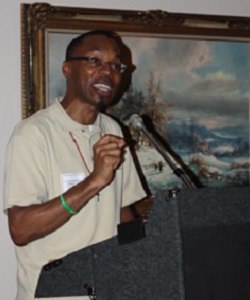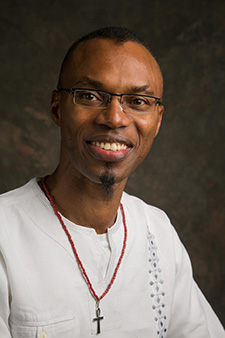
~Fr. Bator
Fr. Bator on Jesuit Works in Eastern Africa
By Brian Harper
Saint Ignatius founded the Society of Jesus in Rome in 1540, but according to Fr. Agbonkhianmeghe E. Orobator, SJ, Ignatius's heart was in Eastern Africa during the fledgling order's early years.
Father Orobator, known as Fr. Bator, is the principal of Hekima University College in Kenya and the former Jesuit provincial of the Eastern Africa Province. Currently the Reverend Francis C. Wade Chair at Marquette University, Fr. Bator was happy to join Jesuit Nation — a Milwaukee-based group that collaborates with the Midwest Jesuits — to share the Society's long history of service in Eastern Africa and the deep ties between the Wisconsin and Chicago-Detroit Provinces and the Eastern Africa Province.
"What's in Eastern Africa today has very, very long and deep roots in Jesuit history," said Fr. Bator, pointing out that Saint Ignatius sent the first Jesuit to Eastern Africa only two years after founding the Society. Eleven years later, he created the Province of Ethiopia, assigning 15 Jesuits and eventually allowing three of them to be made bishops.
"He was already violating the rules he set that Jesuits would never become bishops," laughed Fr. Bator. The early Jesuits' fascination with Ethiopia stemmed from legends of a Christian enclave in the region, which piqued Saint Ignatius's missionary zeal. Though the story was unfounded, the Jesuits continued attempting to develop works in Ethiopia, finally succeeding with an invitation from Emperor Haile Selassie I in 1945.
"You know that definition of insanity, doing the same thing over and over again and expecting a different result?" asked Fr. Bator. "We didn't give up."

|
|
| Listen to an interview with Fr. Bator |
|
|
|
"There is some truth in that saying about Jesuits: when you bunch them up like manure, they stink," he said. "When you spread them out, they really blossom."
That is not to say he is naive about the challenges the Eastern Africa Jesuits face. Jesuits in South Sudan, a country torn apart by civil war, continue to work at risk to their lives every day.
Despite difficult circumstances like these, however, the Society thrives. In Rumbek, South Sudan's former capital, Jesuits run Magis Agricultural Farm School to help farmers become self-sufficient.
"We are not just teaching people to grow crops," said Fr. Bator. "It's also giving people a sense of dignity."
Ocer Campion Jesuit College in Gulu, Uganda, is another success story. For more than 25 years, Joseph Kony's Lord's Resistance Army abducted young Ugandan children, indoctrinating them to terrorize their own people. A tree where Kony used to dine on barbecued beef sits on the school's campus, but rather than serving as a reminder of the violence he unleashed, the tree has found a new purpose.
"Today, there are 500 boys and girls who are studying around that same tree in Ocer Campion Jesuit College," said Fr. Bator.
Father Bator was quick to acknowledge the indispensable relationship between the Eastern Africa Jesuits and the Midwest Jesuits and their lay companions, who began traveling to the region in the late 1970s.
| Click to see photos from Jesuit Nation in Milwaukee, January 27, 2016. |
Still, some people are overwhelmed by the regional conflict and question why the Jesuits even bother to serve in Eastern Africa.
"Every now and then, the conversation will come up: 'Why waste your time in South Sudan? It's broken. It cannot be fixed,'" he said. "And yes, it is broken. But that's why we have to be there. Because we want to be part of the solution."
This perspective was affirmed by another Jesuit who visited Eastern Africa last year: Pope Francis.
"He went to a Jesuit parish of Kangemi: St. Joseph the Worker, which is in one of the slums in Nairobi," said Fr. Bator. "He visited with the people of the slums. He requested a special meeting with them in the Jesuit parish, and Jesuits went and visited with him, as well. His message to us was very, very simple: it is important for you to be here."
Father Bator said the Midwest Jesuits and their supporters help the Eastern Africa Jesuits to be present in these places.
"Through your support, through your prayers, that is what you are making possible in that part of the world," he said. "What you have done and continue to do is actually changing lives. I know it. It is true, and I thank you."
Click to support the Midwest Jesuits' work in Eastern Africa and in other parts of the world.